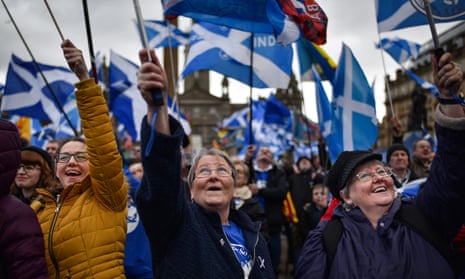The day of the Scottish independence referendum of 2014, I was in Hallglen, a large housing estate on the edge of Falkirk. As it turned out, the town would vote to remain in the UK by 54% to 46%, but where I was, droves of people were turning out to support the end of the union, and the creation of a new country.
I had spent time on the estate over the previous weeks, and observed a remarkable upsurge of both interest in politics, and optimism – not least at a Sunday evening public meeting at which hundreds had gathered to talk about how badly their area had fared since the Thatcher years, and how breaking from the rotten Westminster consensus might serve it better. Now, as people went in and out of the polling station, I fell into conversation with a thirtysomething man, who had a vision of what an independent Scotland might mean for the rest of the UK. “If we start this, we could make a big, proper movement for the rest of the country,” he said. “And I think we should. The poverty in this country – us, and England, and everywhere else – shouldn’t be happening in 2014.”
What, I wondered, was his advice to people south of the border? “Stand up, and ask for a referendum themselves,” he said. “Change it all. Make a movement.”
Less than two years later, an approximation of the political event he seemed to have in mind came to pass: a referendum resulting from peculiarly English tensions, decided chiefly by 15.2m English votes to leave, many of them cast by people with some of the same grievances as independence supporters in Scotland. But, England being England, what the arrival of Brexit symbolised was not the kind of doubling-down on basic social issues that I had witnessed during the independence campaign, but something much more contorted: in part an object lesson in how rightwing politicians benefit from the insecurity and inequality they create, and therefore a spectacular demonstration of the mad state of affairs that currently passes for English politics.
From a Tory party set to lurch even further to the right, to an official opposition that still lacks a coherent Brexit policy, signs of England’s current dysfunction abound. But if you want an image of the country’s basic madness, try the spectacle of Nigel Farage launching the new Brexit party – according to some polls, the frontrunner in the looming European elections – in Clacton, an Essex town that contains one of the poorest neighbourhoods in England.
He spoke having just recruited Ann Widdecombe, a ghoulish vision of the most awful aspects of Conservative England, who wants to butt heads with a new pro-remain party whose candidate list is headed by Boris Johnson’s sister. Meanwhile – has anyone noticed? – English schools are at breaking point, the country’s health service seems to bounce from crisis to crisis, and such elemental issues as housing, the future of work, and social care have vanished from the agenda.
Scotland, by comparison, looks like a model of good sense. In 2016 its electorate voted solidly to remain, by 62% to 38%. The Scottish body politic displays precious few of the ailments that have so disfigured debate in England: Ukip has done little electoral business, conservatism has a comparatively moderate centre of gravity, and debate tends to centre on such trifles as the state of public services and the future shape of the economy.
In that context, the case for splitting away from England is easier to make than ever, and when first minister Nicola Sturgeon spoke last week to the Scottish parliament, she did a pretty eloquent job. “Scotland should be a thriving and driving force within Europe,” she said. “Instead we face being forced to the margins.” Independence, she went on, “would mean that decisions against our will and contrary to our interests cannot be imposed on us by Westminster”.
Ostensibly, she was serving notice that if Brexit goes ahead, the SNP wants another independence referendum by May 2021. But in passages apparently inviting the other parties to join a conversation about increased devolution that would stop short of Scotland’s exit from the UK, she also sounded a more equivocal note, reflecting the fragilities of her position. The SNP has been in power in Scotland since 2007, its star has palpably fallen, and though it retains a reputation for basic competence and an ability to speak to the public mood, it has not amassed much of a convincing policy record.
There are divisions within its ranks, and across the wider independence movement, about the kind of independence to go for: the soft, centrist model proposed by the SNP’s so-called growth commission (whose gradualist approach to a post-independence national currency was rejected at the weekend’s party conference), or the kind of hard, radical path advocated by bolder voices.
So what to do? Viewed cynically, Sturgeon’s manoeuvre is reducible to picking a fight with Westminster over a referendum the UK government is unlikely to allow, so as to buy time, avert people’s eyes from the question of what the party has actually done with power, and assist the SNP’s chances in the 2021 Scottish elections. One big tension sits under everything: the fact that even if independence looks more logical than ever, the politics of actually pulling it off could not be more complicated.
And yet, and yet. If the three-year saga of Brexit tells us anything, it is that the United Kingdom is irretrievably breaking apart. Beyond the glaring fact that Scottish and English politics now have almost nothing in common, there is a deep sense that Brexit is testing some of the UK’s already-fragile institutions to destruction. Even if a Labour government at Westminster succeeded in calming things down by getting to grips with some key social and economic problems and handing Scotland more power, a great mess of unresolved disagreements within England – about immigration, the country’s place in the world, and the basics of what it is to be a modern country – would still fester away, and hold back progress across the UK.
Which brings us back to 2014. Self-evidently, there was much more to the campaign for independence than the SNP; indeed, just about all the most exciting, mould-breaking ideas about a new Scotland came from a coalition of forces – Greens, the radical Scottish left, droves of people new to politics – that a new referendum would presumably revive. If one of the most basic arguments for the end of the union was that Scotland and England were now hopelessly estranged, this now looks almost unanswerable. The UK’s exit from Europe, moreover, surely shreds arguments against other radical changes, pretty much by definition: so if leaving the EU can be accomplished whatever the resulting disasters, why not Scottish independence?
And then there is something I felt deeply in 2014, and that Brexit has sent nuclear. I am English: the country I call home is in a backward-looking mess. But only a few hours’ drive away is a place with at least a sporting chance of pushing itself into the future. If another independence vote materialised, whatever the surrounding tensions and complexities, I would be back there in a flash, to see if at least one part of these islands can leave behind the current wretchedness, and find something better.

